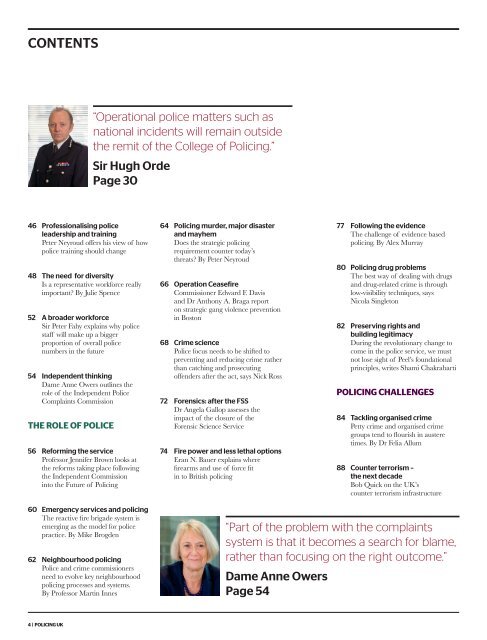Policing UK 2013 - Police Federation
Policing UK 2013 - Police Federation
Policing UK 2013 - Police Federation
Create successful ePaper yourself
Turn your PDF publications into a flip-book with our unique Google optimized e-Paper software.
CONTENTS<br />
“Operational police matters such as<br />
national incidents will remain outside<br />
the remit of the College of <strong>Policing</strong>.”<br />
Sir Hugh Orde<br />
Page 30<br />
46 Professionalising police<br />
leadership and training<br />
Peter Neyroud offers his view of how<br />
police training should change<br />
48 The need for diversity<br />
Is a representative workforce really<br />
important? By Julie Spence<br />
52 A broader workforce<br />
Sir Peter Fahy explains why police<br />
staff will make up a bigger<br />
proportion of overall police<br />
numbers in the future<br />
54 Independent thinking<br />
Dame Anne Owers outlines the<br />
role of the Independent <strong>Police</strong><br />
Complaints Commission<br />
THE ROLE OF POLICE<br />
56 Reforming the service<br />
Professor Jennifer Brown looks at<br />
the reforms taking place following<br />
the Independent Commission<br />
into the Future of <strong>Policing</strong><br />
64 <strong>Policing</strong> murder, major disaster<br />
and mayhem<br />
Does the strategic policing<br />
requirement counter today’s<br />
threats? By Peter Neyroud<br />
66 Operation Ceasefire<br />
Commissioner Edward F. Davis<br />
and Dr Anthony A. Braga report<br />
on strategic gang violence prevention<br />
in Boston<br />
68 Crime science<br />
<strong>Police</strong> focus needs to be shifted to<br />
preventing and reducing crime rather<br />
than catching and prosecuting<br />
offenders after the act, says Nick Ross<br />
72 Forensics: after the FSS<br />
Dr Angela Gallop assesses the<br />
impact of the closure of the<br />
Forensic Science Service<br />
74 Fire power and less lethal options<br />
Eran N. Bauer explains where<br />
firearms and use of force fit<br />
in to British policing<br />
77 Following the evidence<br />
The challenge of evidence based<br />
policing. By Alex Murray<br />
80 <strong>Policing</strong> drug problems<br />
The best way of dealing with drugs<br />
and drug-related crime is through<br />
low-visibility techniques, says<br />
Nicola Singleton<br />
82 Preserving rights and<br />
building legitimacy<br />
During the revolutionary change to<br />
come in the police service, we must<br />
not lose sight of Peel’s foundational<br />
principles, writes Shami Chakrabarti<br />
POLICING CHALLENGES<br />
84 Tackling organised crime<br />
Petty crime and organised crime<br />
groups tend to flourish in austere<br />
times. By Dr Felia Allum<br />
88 Counter terrorism –<br />
the next decade<br />
Bob Quick on the <strong>UK</strong>’s<br />
counter terrorism infrastructure<br />
60 Emergency services and policing<br />
The reactive fire brigade system is<br />
emerging as the model for police<br />
practice. By Mike Brogden<br />
62 Neighbourhood policing<br />
<strong>Police</strong> and crime commissioners<br />
need to evolve key neighbourhood<br />
policing processes and systems.<br />
By Professor Martin Innes<br />
“Part of the problem with the complaints<br />
system is that it becomes a search for blame,<br />
rather than focusing on the right outcome.”<br />
Dame Anne Owers<br />
Page 54<br />
4 | POLICING <strong>UK</strong>
















